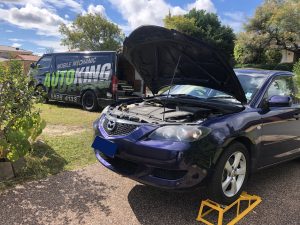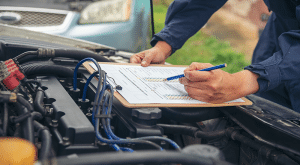The best way to reduce the risk of being involved in an accident is to practice safe driving behaviors. Whether you’re just learning to drive or you’ve been behind the wheel for decades, it’s a good idea to review some basic rules for safe driving.
Although you can’t control the actions of other motorists, you have a great deal of control over how you operate your vehicle. That means you can increase your chances for a safe trip by following a few simple precautions.
Keep your distance Tailgating leads to rear-end collisions, and you will be the one to foot the bill for the repairs. 1/3 of all traffic accidents are caused by tailgating and could be prevented with proper distance. Give yourself some extra time to react to traffic by adding some distance between you and the vehicle in front of you.
Stay in your lane Pick the best lane and stick with it for safety and efficiency, It seems like a good idea to work your way through traffic by switching into faster-moving lanes. Staying in the same lane keeps you on a steady track and allows you to be ready for your next turn ahead of time, increasing safety.
Plan ahead Reading a set of directions or repeatedly adjusting a GPS creates a dangerous situation when a driver should be focused on the road. Proper route planning ahead of time allows drivers to maintain focus and get through and get through stops in the fastest manner while leaving danger out of the question.
No Texting, Avoid Distraction The urge to see and return a text while driving is strong. Resist it. Phone usage can wait until you parked. It isn’t just cell phones that cause distractions, however. Eating, applying makeup, fiddling with electronic devices, or interacting with passengers also diverts a driver’s attention in potentially deadly ways. Perhaps the best advice on driving distractions came from rocker Jim Morrison: “Keep your eyes on the road, your hands upon the wheel.
Maintain the Vehicle Vehicle maintenance isn’t just an important way to extend your car’s life – it’s a major safety issue. Regular oil changes and fluid checks can save you from surprise breakdowns on the road. One of the most common maintenance problems that can lead to a crash is improper tire pressure. Uneven tire pressure, or pressure that is too high or low, can impact performance or lead to a blowout – especially in high-performance cars or heavy vehicles like SUVs. Another key area is the car’s brakes. If you notice some “softness” in the brake pedal or feel a vibration when the brakes are applied, get them checked out by a professional mechanic.
Always, Buckle Up! Many car accident fatalities could be prevented each year, by simply wearing a seat belt. Worn properly, they prevent you from being thrown around the inside of a crashing vehicle or, worse, thrown through the windshield and flung completely out of the vehicle. It is a law for a reason. The simple act of fastening a seat belt saves lives and makes sure you are safe.
Get Your Rest Driving while over-tired has been shown to be nearly as dangerous as driving under the influence. If a driver is tired enough to actually fall asleep while driving, the results are predictable. Even on a relatively straight highway, a sleeping driver will eventually drift off the road. Trees, utility poles, ravines, and bridge abutments turn this into a deadly scenario and that doesn’t even take other cars into account. Make sure to get plenty of rest.
Improvements in technology will continue to help lessen accidents, but the bottom line remains that most car accidents are the result of human error. The best way to reduce the risk of being involved in an accident is to practice safe driving behaviors. Above all else, make sure you’re covered with an affordable car insurance policy.
Although you can’t control the actions of other motorists, you have a great deal of control over how you operate your vehicle. That means you can increase your chances for a safe trip by following a few simple precautions.
Here are some safe driving tips to know the basics of safe driving and practice them every time you’re on the road
Slow Down, Obey Speed Limits When driving, it’s important to stick to the posted speed limit at all times. The restrictions placed on vehicle speed are not established arbitrarily. Rather, they are carefully selected to maximize safety for drivers and for individuals in the homes, businesses, and other organizations in the areas where roadways are located. The faster you travel, the longer it takes to stop, and the bigger the impact when you crash. But do travel along with the flow of traffic, as long as it does not exceed recommended limits.Keep your distance Tailgating leads to rear-end collisions, and you will be the one to foot the bill for the repairs. 1/3 of all traffic accidents are caused by tailgating and could be prevented with proper distance. Give yourself some extra time to react to traffic by adding some distance between you and the vehicle in front of you.
Stay in your lane Pick the best lane and stick with it for safety and efficiency, It seems like a good idea to work your way through traffic by switching into faster-moving lanes. Staying in the same lane keeps you on a steady track and allows you to be ready for your next turn ahead of time, increasing safety.
Plan ahead Reading a set of directions or repeatedly adjusting a GPS creates a dangerous situation when a driver should be focused on the road. Proper route planning ahead of time allows drivers to maintain focus and get through and get through stops in the fastest manner while leaving danger out of the question.
No Texting, Avoid Distraction The urge to see and return a text while driving is strong. Resist it. Phone usage can wait until you parked. It isn’t just cell phones that cause distractions, however. Eating, applying makeup, fiddling with electronic devices, or interacting with passengers also diverts a driver’s attention in potentially deadly ways. Perhaps the best advice on driving distractions came from rocker Jim Morrison: “Keep your eyes on the road, your hands upon the wheel.
Maintain the Vehicle Vehicle maintenance isn’t just an important way to extend your car’s life – it’s a major safety issue. Regular oil changes and fluid checks can save you from surprise breakdowns on the road. One of the most common maintenance problems that can lead to a crash is improper tire pressure. Uneven tire pressure, or pressure that is too high or low, can impact performance or lead to a blowout – especially in high-performance cars or heavy vehicles like SUVs. Another key area is the car’s brakes. If you notice some “softness” in the brake pedal or feel a vibration when the brakes are applied, get them checked out by a professional mechanic.
Always, Buckle Up! Many car accident fatalities could be prevented each year, by simply wearing a seat belt. Worn properly, they prevent you from being thrown around the inside of a crashing vehicle or, worse, thrown through the windshield and flung completely out of the vehicle. It is a law for a reason. The simple act of fastening a seat belt saves lives and makes sure you are safe.
Get Your Rest Driving while over-tired has been shown to be nearly as dangerous as driving under the influence. If a driver is tired enough to actually fall asleep while driving, the results are predictable. Even on a relatively straight highway, a sleeping driver will eventually drift off the road. Trees, utility poles, ravines, and bridge abutments turn this into a deadly scenario and that doesn’t even take other cars into account. Make sure to get plenty of rest.
Improvements in technology will continue to help lessen accidents, but the bottom line remains that most car accidents are the result of human error. The best way to reduce the risk of being involved in an accident is to practice safe driving behaviors. Above all else, make sure you’re covered with an affordable car insurance policy.
Auto King Mobile Mechanics can come to you for any vehicle repair, service, and inspection needs. Book or Call for a free quote!





